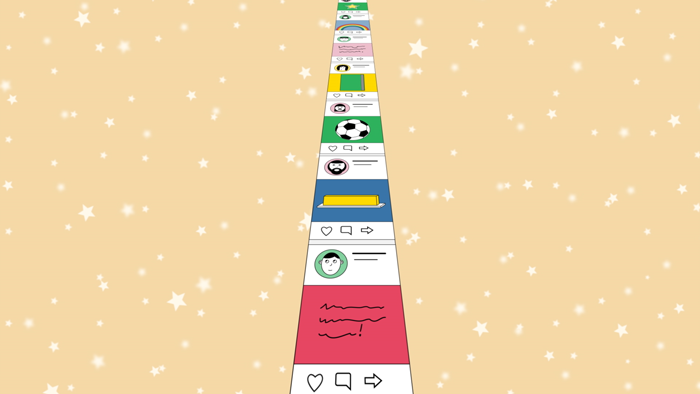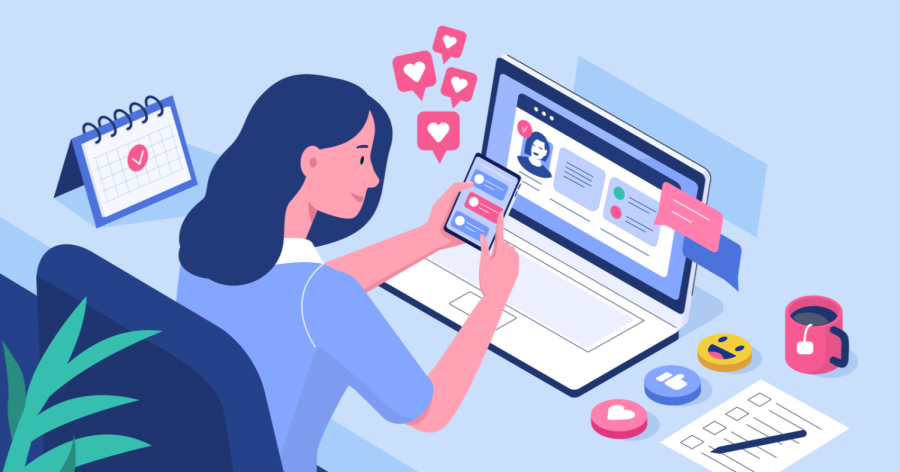Have you ever picked up your phone intending to look at what heated debate Twitter has gotten into or to find that one TikTok in your favorites that you just need to show your friend? It’s supposed to be a five to ten-minute ordeal, however, you look over at the time while watching Golden Retrievers puppies play in snow for the first time- oh my, they are so cute! Right. It’s been two hours.
Why exactly does that happen, and what responses does the brain give that make it so easy to keep scrolling?
The demographic focused on in this article is teenagers (ages 13-19) however keep in mind that teens are not the only demographic being affected by social media. While 88 % of teens use some type of social media, according to King’s University, 78% of adults aged from 30-49 use it regularly as well as 64 % of adults aged from 50- 64. It has become an integral part of many people’s lives and continues to affect everyone in both positive and negative ways.
An experiment, conducted by psychologists using a device called a Skinner Box, with mice, a lever, and cheese displayed such. Filling the lever up with cheese, the mice would keep pushing on the lever to attain the cheese even if there was none. This is called a Reward System, and it is similar to the way brains respond to social media. Instead of cheese, however, brains attain dopamine, a type of neurotransmitter that plays a role in the feeling of happiness.
This is what makes social media addictive. The release of dopamine from repeated exposure to stimuli leads to a chronic dopamine-deficit state. Infinite content and stimuli combined with easy access to the material make this common among social media users. Stanford psychiatrist Anna Lembke also states this is the reason why while being on social media apps feels good, but the minute the app closes feelings of dismay set in.
The NCBI (National Center for Biotechnological Information) says that there is a direct correlation between heavy social media use and depression or anxiety. According to a study, there was a 70% increase in self-reported depressive symptoms. Furthermore, The National Institute of Health reports that 49.5% of adolescents will experience a mental illness in their lifetime, and 22% will experience severe mental impairments.

Social media seems to have many negative effects, but are there any positive benefits? Cornell University details 11 studies in which people reported social media had a positive effect on their emotions. It helped relieve negative emotions such as stress, annoyance, and anger, replacing them with emotions such as excitement and laughter. Furthermore, many people point to social media as the reason in which many can keep an emotional connection with family and friends which they do not regularly interact with.
Some youth describe that social media helped them figure out their identity, and gave them a safe space to become their person. They state it gave them a chance to express themselves and helped boost their self-confidence. Studies show that teens felt social media gave them a chance to expand their education to many different backgrounds and perspectives in the real world.
Social media is becoming a part of regular life, but the effects are still being researched and investigated. Are there any positive or negative effects you have observed or experienced with social media? Let us know in the comments below!
Sources:
Digital Media Literacy: Why We Can’t Stop Scrolling. (2022). Retrieved 9 January 2022, from https://edu.gcfglobal.org/en/digital-media-literacy/why-we-cant-stop-scrolling/1/
Goldman, B., Goldman, B., Costello, P., White, T., & Conger, K. (2021). Addictive potential of social media, explained. Retrieved 9 January 2022, from https://scopeblog.stanford.edu/2021/10/29/addictive-potential-of-social-media-explained/
Karim, F., Oyewande, A., Abdalla, L., Chaudhry Ehsanullah, R., & Khan, S. (2020). Social Media Use and Its Connection to Mental Health: A Systematic Review. Cureus. doi: 10.7759/cureus.8627
Mental Illness. (2022). Retrieved 9 January 2022, from https://www.nimh.nih.gov/health/statistics/mental-illness#part_155771
The Pros and Cons of Social Media for Youth. (2022). Retrieved 9 January 2022, from https://evidencebasedliving.human.cornell.edu/2021/10/18/the-pros-and-cons-of-social-media-for-youth/
The Psychology of Social Media | King University Online. (2022). Retrieved 9 January 2022, from https://online.king.edu/news/psychology-of-social-media/
Images:
Digital Media Literacy: Why We Can’t Stop Scrolling. (2022). Retrieved 9 January 2022, from https://edu.gcfglobal.org/en/digital-media-literacy/why-we-cant-stop-scrolling/1/
Top 5 Reasons Why You Need a Social Media Manager. (2021). Retrieved 10 January 2022, from https://www.searchenginejournal.com/top-reasons-why-you-need-social-media-manager/273333/
Disclaimer: Copyright Disclaimer under section 107 of the Copyright Act 1976, allowance is made for “fair use” for purposes such as criticism, comment, news reporting, teaching, scholarship, education and research. Fair use is a use permitted by copyright statute that might otherwise be infringing. Non-profit, educational or personal use tips the balance in favor of fair use.



